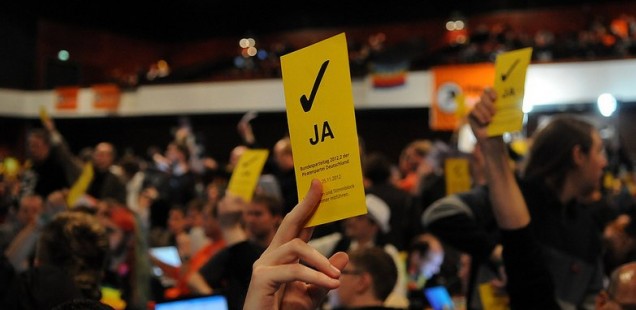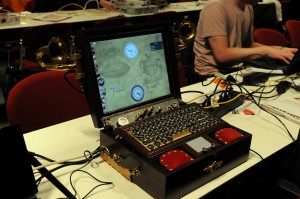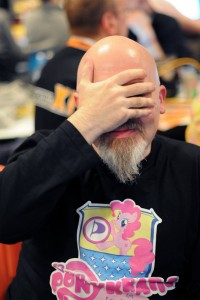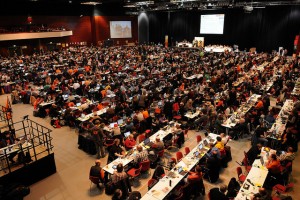German Pirate Convention struggles but pulls through on important issues | PirateTimes

German Pirates pull through on issues despite struggle with formalities
Last weekend, the Pirate Party of Germany held their second federal party convention of 2012 in the Ruhr city of Bochum, Northrhine Westphalia. Over 2000 registered Pirates from all over the country came to discuss and vote on motions for the party manifesto. The party’s working groups had improved upon the motion texts tirelessly for months – through late-night teleconferencing sessions via Mumble, the primary working mode of PPDE, as well as on several face-to-face meetings, like EuWiKon earlier this year. Compared to earlier Pirate conventions, the agenda was quickly agreed upon. After that, however, progress became increasingly slower.
The very first topic was to determine a basic stance on economic policy. A showdown between two motions took the whole morning and the better part of the afternoon, only to conclude with a modularised vote that allowed most parts of one and a short version of the other. The conclusions for PPDE is that economic policy has to be based on freedom, transparency, fairness and sustainability. Classic economic metrics like GDP growth are not seen as comprehensive indicators for people’s welfare, which should be the prime objective of the economy, nationally and globally. The manifesto now also calls for ecologically sustainable economics and green jobs, consumer protection and a minimum wage – the latter at least until a basic income guarantee is realized independent of employment status.
Laura Dornheim, who, together with three other pirates (Alexander Bock, André Presse and Nicolas Weinhold), had worked out the modularised motion said:
“For the first time, we have a basic manifesto on economic policy, that’s the most important part. The preamble clearly states that it’s political decision making which guides economic policy, not economic actors that force their agenda upon politicians. Further we believe that full employment is not a sensible goal [anymore].”
Arne Pfeilsticker and a large number of pirates from various working groups (this working group was named “Closing of Ranks”) drafted the other motion. It stressed freedom, fairness and sustainability and was tailored to fit existing party values. He commented:
“We are happy that this [part of the] basic manifesto was approved by such a clear majority”.
After the cumbersome process toward agreeing a position on economic issues, a motion on social inclusion led to a similar storm of procedural motions for repeated re-voting. While its overall content was widely approved, it also included controversial language by explicitly protecting “national” identity. A long discussion and two voting rounds later, it was rejected. An improved version of the motion was accepted the next morning as a position paper.
At the end of the first day, the convention’s Twitter hashtag buzzed with comments on procedural issues. While a few considered the slow pace a price they would gladly pay for grassroots-democracy, many Pirates voiced discontent with, what they felt were, stalling tactics by trolls who used every conceivable loop-hole they could find in the convention’s procedure rules to revisit and delay decisions.
The second day changed the situation. Several motions were put forth that concerned how the party would position itself in Europe and the rest of the world. A comprehensive draft about foreign policy was accepted into the manifesto. The main idea is to carry Pirate ideals like citizen participation and democracy out into the world – including democratisation of European and International Organisations. The text also includes provisions on free flow of information, transparency in negotiations of international agreements as well as some basic rights, which Pirate foreign policy seeks to promote. It was complemented by paragraphs from other motions that added a very clear preference on solving conflicts peacefully and postulated that foreign policy shall not only serve national interest, but the interest of all mankind.The working group on Foreign and Security Policy’s Fotios Amanatides attributed the success of their complete motion to the fact:
“that we’ve really worked on this for months – we’ve continued improving it after Potsdam (Pirate conference on foreign policy in July), so it could reach the quality it ultimately had.”
PPDE also adopted a motion that defined their general stance towards Europe. The party now officially recognizes and embraces the achievements of European Integration for the continent and recognizes that European Policy is no longer Foreign Policy. However, it calls for increased options for participation of citizens and transparency in European political structures. Ultimately, this shall be solved through a European constitution, which has to be worked out democratically and through the participation of all Europeans.
PPDE’s ‘Working Group Europe’ has already prepared proposals on how to go about this in detail, but due to time constraints none of them could be tabled at the convention. The Coordinator of the Working Group Europe, Gilles Bordelais, commented:
“[…] this shall be the foundation stone for all our program related motions on Europe. We now have a clear commitment to Europe; this is very important as it was previously missing in our manifesto. And it’s not just for any kind of Europe, but our position says that the people should not only be considered, but should actively participate.”
As the Pirates were becoming tired, mostly due to a long discussion on proposals that were first and foremost concerned with party statutes, an easter egg motion was put on the agenda. The humourous text asked for the party to drive forward the research on time travel. The mover suggested that it could be used to retrospectively “fix crappy party conventions”. The ensuing discussion served as comic relief, as some speakers claimed to be sent to the convention from the future – supposedly to tell them how they should vote on the motion.
LMVBlume – the mascot of the Northrhine Westfalian Pirates
Ultimately, the motion did not carry, but the convention seemed more energised after this break from serious politics and continued to add paragraphs on many additional issues to their manifesto at a good working pace. Among other things, they agreed on basic positions for health and environmental policy, a reform of media-age restrictions as well as a whole bunch of proposals within the core areas of the party: transparency, anti-corruption, privacy and data protection.
There was also some discussion on how to avoid slow-paced decision making in the future, with a group of Pirates advocating for a permanent online convention. However, the issue was postponed. The German Pirates will convene again in May, where they will most likely refine some of the points agreed on last weekend as well as add more points to their manifesto.
Quotes were kindly provided by the Krähennest Pirate Podcast.
Photos: CC-BY-SA 2.0 Joachim S. Müller

About Patrick Schiffer
I am living in Duesseldorf, Germany and I am a Member of the Pirate Party since March 2012. I’ve studied Arts & Visual Communication at the University of Maastricht in the Netherlands. I speak german, english, french and dutch fluently. I am interested in developing & spreading the ideas coming out of and getting into the Pirate movement worldwide. For that, I think this international newsletter is a great thing. And I’d love to work & communicate with pirates from different countries all over the world so that I would like to help and contribute by spreading news, commenting, making graphics, writing & lectorating for Pirate Times. I am active in several working groups in Germany and in co-coordinating the founding of the PP EU.
All content is CC-BY if not mentioned otherwise. Please link back to us if using content.
-
- Pingback: German Pirates pull through on issues despite struggle with formalities | Piraten | Scoop.it()
-
- Pingback: German Pirates pull through on issues despite struggle with formalities « Occupy The Polls()
-
- Pingback: Flattr Appreciation During October Euro 29.81 | PirateTimes()
-
- Pingback: What is happening in the Pirate Party of Germany? | PirateTimes()
-
- Pingback: Mais que se passe t’il chez nos amis Pirates allemands ? | PirateTimes()



















Recent Comments